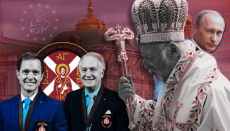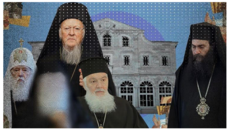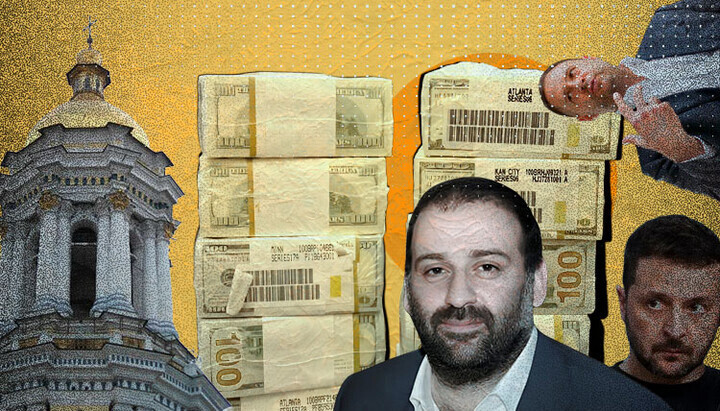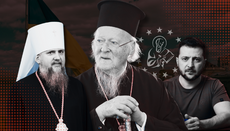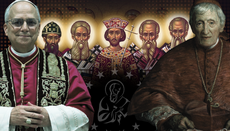GOARCH 'Receives' Defrocked ROCOR Priest Alexander Stepanenko into Slavic Vicariate
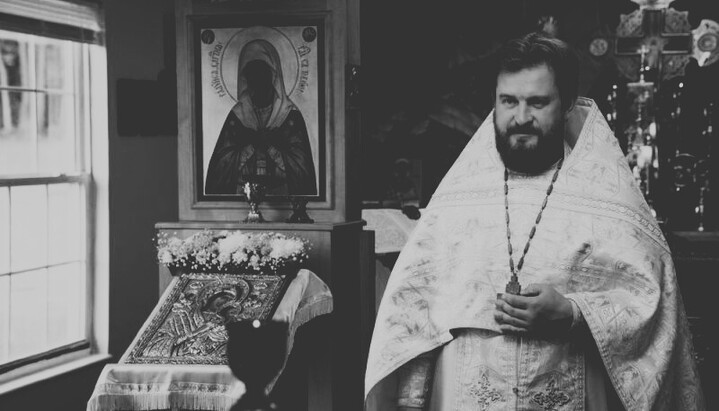
Stepanenko was suspended by ROCOR in December 2024 and defrocked in May 2025. At some point in between, he was "received" into the Slavic Vicariate of the Greek Orthodox Archdiocese of America—without a canonical release from ROCOR. The Stepanenko incident has already drawn a backlash, not only from the Russian Church Abroad, but from the Serbian Church, as well.
CHARLOTTE, NC — It was the first Sunday after Pentecost at St. Nektarios Greek Orthodox Church. Like any Sunday, the chanters prepared the kliros, the A/V team prepared to go live on YouTube, and the clergy prepared for the liturgy.
This Sunday was different, however, as anyone watching the livestream would soon see and hear.
Shortly after the liturgy began, an unfamiliar voice rang out from the altar. It wasn't just the tone that was unfamiliar to regulars, but the language: only a handful of Russians and Ukrainians in the pews would have understood the Church Slavonic. As the liturgy concluded, the clergy stepped out onto the Ambo, and Fr. Andreas Houpos, rector of St. Nektarios, introduced the man dressed in Russian-style vestments.
This new priest, Fr. Andreas said, was joining them today with the express permission of Archbishop Elpidophoros. His name was Alexander Stepanenko.
While Stepanenko was seemingly unknown to Fr. Andreas, many of the parishioners knew him all too well. And they knew something about him, of which Fr. Andreas was seemingly unaware: Stepanenko was defrocked by ROCOR just weeks before serving with him at the altar of St. Nektarios.
The scandal swept through Charlotte’s Orthodox community, according to UOJ sources. And it wasn't only the Greeks and Russians who were upset. Bishop Irenij of the Serbian Orthodox Church was briefed on the situation and released a declaration to his flock of the Serbian Eastern American Diocese:
You are hereby informed that Alexander Stepanenko, a former cleric of the Russian Orthodox Church Outside of Russia, has been defrocked by the Holy Synod and removed from the ranks of the Orthodox clergy, in accordance with the directive of the Secretariat of the Russian Orthodox Church outside of Russia, No. 898 of June 21, 2025.
Therefore, any form of ecclesiastical interaction with Alexander Stepanenko, including concelebration and participation in the Holy Sacraments, is strictly prohibited. To avoid any possible conflict or misunderstanding within the community, it is incumbent upon all members, both clergy and congregation alike, to comply with this directive without exception.
The above is for your information and, accordingly, implementation.
How did this happen? Who is Stepanenko, and who is his bishop?
The former archpriest Alexander Stepanenko is a native of Chernigov (Chernihiv), Ukraine, and graduated from the Kiev Theological Seminary. In 2013, he was assigned to the Reigning Mother of God Parish, a ROCOR church in Charlotte, North Carolina. On 1 December 2024, Stepanenko was suspended by the Holy Synod of the Russian Orthodox Church Outside of Russia. On May 9, 2025, a spiritual court declared that Stepanenko was to be removed from the clerical state.
However, at some point between his suspension and his defrocking, Stepanenko was “received” into GOARCH’s Slavic Vicariate.
According to the Vicariate’s website, Stepanenko now serves as priest of the Parish of Holy Trinity in Charlotte, North Carolina. (The UOJ could find no address or legal registration of incorporation for the parish.) The website also states that this community celebrated its first Divine Liturgy on June 8, 2025, less than a month after Stepanenko was defrocked by ROCOR.
The UOJ reached out to St. Nektarios Church, the Metropolis of Atlanta, and the Greek Archdiocese asking for comment. As of press time, we have received no reply.
A representative of the Slavic Vicariate did respond to the UOJ’s request for comment. However, he refused to identify himself.
The Slavic Vicariate’s unnamed spokesman confirmed that Stepanenko was “received” into the Vicariate, without a canonical release, following his suspension from ROCOR but prior to his defrocking. However, the spokesperson also refused to specify the date of Stepanenko’s “reception.”
The reason that Stepanenko was defrocked has not been made public by ROCOR (it is unusual for a bishop or synod to disclose the priest’s alleged crimes unless there is a grave threat to the public). The UOJ asked the Slavic Vicariate what led to their decision to “receive” Stepanenko. Did they request the files on his suspension from ROCOR? Did they determine that the accusations against Stepanenko were unfounded? If so, what evidence did they acquire?
The unnamed spokesman for the Slavic Vicariate told the UOJ in an email:
Fr. Alexander is a native of Ukraine, from the war-torn Chernihiv region. He was suspended by ROCOR after publicly speaking out against the war in Ukraine, the ideology of the “Russian World,” and the blessing of military violence by clergy. His stance was one of moral conviction — and it was punished not for canonical infractions, but for telling the truth.
As you surely know, ROCOR continues to commemorate Patriarch Kirill, under whose leadership clergy bless weapons of war. Fr. Alexander publicly condemned this practice. For this, he was subjected to psychological pressure, ecclesiastical harassment, and ultimately punitive action.
The UOJ spoke to Archpriest George Temidis, Secretary of the Diocesan Administration Eastern American Diocese ROCOR, about the Slavic Vicariate’s claim that Stepanenko was defrocked for opposing the War in Ukraine. Temidis replied:
While it is not appropriate to comment on the case of individual pastoral determinations, it can be categorically stated that the ROCOR has never defrocked a cleric on grounds of his position on the war in Ukraine, or any other political matters. Our clergy hold a wide variety of personal political opinions, and are free to do so; and the ROCOR herself has openly and vocally stood against the bloodshed in Ukraine from the first. Defrockings, as rare as they are, are never made in reaction to political questions but solely in response to serious violations of the long-established Holy Canons of the Orthodox Church that demand such a response (and these have no political orientation, but only ecclesial and moral). If some chose to ignore these canonical determinations, attempting to justify such actions by invoking false and obviously inflammatory political motivations, such regrettable actions of course have no validity and provoke only our more fervent prayer that peace and canonical rectitude will reign in the Church.
Indeed, ROCOR and its bishops have repeatedly condemned Russia’s invasion of Ukraine.
In May of 2022, Metropolitan Mark of Berlin called the war a “crime” and stated it “must stop immediately.”
In July of 2022, ROCOR’s European bishops published a pastoral epistle deploring the “terrible war in Ukraine” and its “bloodshed” while calling for prayers and aid for refugees.
In September of 2023, Bishop Irenei of London issued a statement saying: “We stand wholly against the war and we call for it to end.”
The UOJ also asked the Slavic Vicariate why they “received” Stepanenko without a canonical release from ROCOR. The unnamed spokesman gave the following reply:
Fr. Alexander was received canonically into the Slavic Vicariate before ROCOR’s final decision, and with full transparency regarding his circumstances.
Let us also remind you that the Ecumenical Patriarchate — according to the ancient canonical order — maintains supreme ecclesiastical jurisdiction over territories outside the historical boundaries of autocephalous Churches, including the so-called “barbarian lands” (cf. Canon 28 of the Council of Chalcedon).
This is a bold claim, and not only because the Ecumenical Patriarchate’s interpretation of Canon 28 of Chalcedon is rejected by most Orthodox bishops.
More urgently, the UOJ understands that Stepanenko was received by Archbishop Elpidophoros of America, not Patriarch Bartholomew of Constantinople. The spokesman for the Vicariate therefore seems to imply that the powers allegedly granted by Canon 28 of Chalcedon extend beyond the person of the Patriarch of Constantinople to the Archbishop of America. This would also imply that the Archbishop of America enjoys personal authority over every other bishop in the United States, regardless of jurisdiction ― indeed, that his authority surpasses that of an entire synod of canonical bishops.
The UOJ reached out to the Department of Communications for the Greek Archdiocese to ask if Archbishop Elpidophoros concurs with the Slavic Vicariate’s interpretation of Canon 28. We have not received a reply.
This is not the first time the Greek Archdiocese has “received” defrocked ROCOR clergy. Indeed,the Slavic Vicariate was erected for just such a purpose. Its leader, Alexander Belya, was laicized by ROCOR after insisting upon his right to be consecrated a bishop, amid serious allegations of wrongdoing. Belya sued the late Metropolitan Hilarion (Kapral), then First Hierarch of the Russian Church Abroad.
Metropolitan Hilarion was successfully defended by the Becket Fund. “Priests don’t get to drag their former churches to trial over internal disciplinary deliberations,” said Diana Thomson, senior counsel at Becket. “The court’s ruling ensures this remains true and protects churches’ freedom to live, teach, and govern without being sued for how they communicate internally about clerical decisions.”
Despite the fact that Metropolitan Hilarion was vindicated by both the Holy Synod of ROCOR and the U.S. District Court for the Southern District of New York, the Greek Archdiocese received Belya into its ranks. He was appointed vicar of the newly-formed Slavic Vicariate. The Archdiocese then moved to consecrate Belya as bishop of the Vicariate, but the Assembly of Canonical Bishops threatened to disband if Archbishop Elpidophoros went through with Belya’s elevation.
Belya’s father, the former archpriest Alexander Belya, followed his son out of ROCOR and into the Vicariate. The Belyas were also joined by the former archpriest Ioann Spasyuk, who was defrocked by the Belarusian Orthodox Church in the 1990s and spent three decades moving from one schismatic group to the next.
The UOJ will continue to report on this story as it develops.
